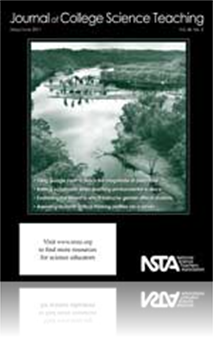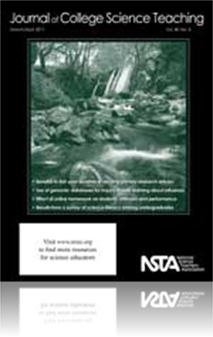All Journal of College Science Teaching resources
Journal Article
Point of View: Teach Both Sides on Global Warming
This column shares reflections or thoughtful opinions on issues of broad interest to the community. In this month’s issue the author encourages teachers to teach both sides of global warming, thus teaching students how to evaluate evidence and reco...
Journal Article
The Use of Mastery Learning With Competency-Based Grading in an Organic Chemistry Course
Mastery learning is an instructional method based on the idea that students learn best if they fully understand one concept before moving to the next and has been shown to be extremely effective in math and science curricula. Competency-based grading...
Journal Article
Strategies for the Introduction of Neuroscience for Underrepresented University Students
The University of Puerto Rico Mayaguez hosted a series of academic and applied neuroscience activities as part of a Brain Awareness Week (BAW). The study in this article explores the impact of the BAW events as a vehicle for advancing interest in and...
Journal Article
Using Google Earth to Teach the Magnitude of Deep Time
Most timeline analogies of geologic and evolutionary time are flawed, causing an understanding of relative time with little comprehension of absolute time. Using Google Earth, one can construct an ideal timeline analogy relative to a point in the cla...
Journal Article
Hot Under the Collar: Weighing the Dangers of a Weight-Loss Drug
This column provides original articles on innovations in case study teaching, assessment of the method, as well as case studies with teaching notes. In this month’s issue the goal of the case study is for students to expand their understanding of m...
Journal Article
Instructor Gender and Student Confidence in the Sciences: A Need for More Role Models?
This article examines the extent to which college-level instructor gender affects the confidence of males and females in their scientific abilities....
Journal Article
Battling Ecophobia: Instilling Activism in Nonscience Majors When Teaching Environmental Issues
This article describes an approach to teaching about environmental issues that helps instill a sense of agency in the young learner. Students identify five lifestyle behaviors that contribute to environmental degradation and come up with an alternati...
Journal Article
The Brooklyn Opportunities in Science and Careers (BOSC) program aims to increase student participation in physics, environmental studies, geology, and teaching science using a career-focused strategy to recruit students. Students work in collaborati...
Journal Article
McLean v. Arkansas (1982) and Beyond: Implications for Biology Professors
To assess current trends of evolution instruction in high schools of the mid-South, the authors had Arkansas high school biology teachers and students enrolled in a freshman-level nonmajors biology course at a midsize public Arkansas university respo...
Journal Article
A Comparison of Two Forms of Assessment in an Introductory Biology Laboratory Course
Because of enrollment increases, many institutions have advocated the replacement of free-response exams with forced-choice exams as a time-saving strategy. The study in this article evaluated the replacement of free-response practical-examination qu...
Journal Article
A Novel Instrument for Assessing Students' Critical Thinking Abilities
In this article the authors describe the Assessment of Critical Thinking Ability survey and its preliminary application to assess the critical thinking skills of undergraduate students, graduate students, and postdoctoral fellows....
Journal Article
Research and Teaching: Incorporating Active Learning Techniques Into a Genetics Class
We revised a sophomore-level genetics class to more actively engage the students in their learning. The students worked in groups on quizzes using the Immediate Feedback Assessment Technique (IF-AT) and active-learning projects. The IF-AT quizzes all...
Journal Article
First-Year Students Benefit From Reading Primary Research Articles
Primary research articles discuss aspects of scientific inquiry that are important in understanding the nature of science. Yet, most introductory science courses use textbooks that ignore the scientific process; opportunities for explicit discussion ...




